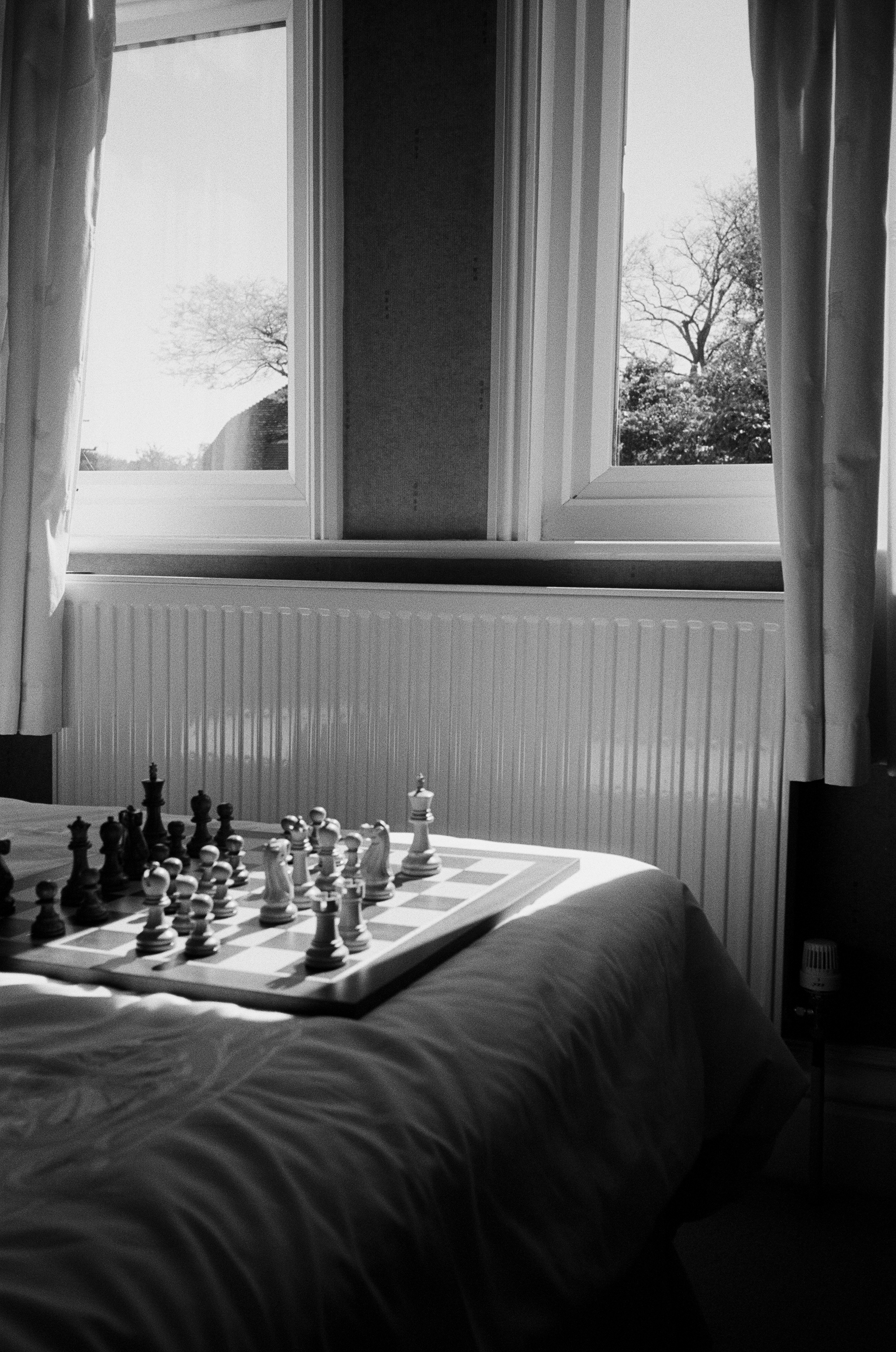Out of the
passenger window were four illuminated panels, flashing past. I walked up to
the building, which was set back from the road, behind a wooden fence and thick
uncut grass. A woman was sat on a bench in the dusk darkness, smoking a
cigarette and looking at nothing, certainly not at me as I passed by. Night was
sliding its mouth over the earth and only in the distance was there the
faintest rim of blue, silhouetting the trees and muffling the birds.
I was late,
nervous. The village hall had the smell of all village halls, old varnish,
older wood, cleaning products, teastains, crumbs in crannies. Hand sanitiser
and signing myself in. The main room was home to nine tables with a pair of men
at each, sat in silence, a chessboard between them. There was a woman sat
crosslegged on a stool, she did not look up but was colouring something in she
had pinned to a clipboard, her scratching pencil was the only sound besides the
ticks of nine timers tocking.
At the
table was an old white man playing a little Chinese boy. Both looked up at me. ‘R—,
I presume?’ I nodded. It was Lambert. He was taller than I imagined. ‘Please
sign in there.’ I did so. He looked around. ‘I’m afraid you’ll have to wait for
a game.’ I told him not to worry. I observed their game. Lambert had told me
about this child before, his name was Felix, I remembered. Lambert told me he
had talent. Felix looked at me nervously; he regarded the board and his opponent
and teacher nervously. He moved confidently and he often gave Lambert cause for
concern, however Lambert might occasionally interrupt his swiping hand with—‘Watch
out for rook.’ Felix even stared at me as though to apologise. I smiled at
Felix but he could not see it behind my mask.
Down the
other end of the room a man arose, the game finished. Lambert indicated that I
should go over. I was trembling when I sat opposite my opponent who was a very
old man, the oldest there. His back was hunched, his liverspotted skull half
concealed behind a pale blue disposable mask. Should I shake his hand? I picked
up a white and black pawn, hid them behind my back then presented my clenched fists
to him. The skin on his pointing hand was transparent; he would play white. In
the first game I miscalculated an attack, missing the pin he had on my e-pawn.
Not long later, with all his major pieces aimed at f7, I resigned.
Around the
room, games continued with people changing boards. All the players were men,
from ten-year-old Felix to the ninety-year-old in front of me. At Lambert’s
table a few boys had gathered round to watch, and Lambert talked them through
the tactics. They listened intensely, fixated. I smiled. At first all had been
silent but now, after a few games, the men were loosening up and conversating.
It was good.
In the
second game I played white. My elderly opponent blundered his queen on move five;
I offered a takeback, but he politely declined, shaking his head. ‘I’ve been
out of practice,’ he told me. I tried to make conversation but he could not
hear me, so we just played chess. Without his queen, he had no chance. I
crushed him, overwhelmed his queenside, forced his king to the centre of the
board and delivered checkmate.
I excused
myself and went to the toilet. When I returned, he had assumed a more
comfortable pose, crossed his legs and turned himself slightly away from the
board. He was getting serious now, but I had psyched myself up in the toilet. I
was calmer now. The sweat in my palms had dried, my fingers no longer shaking. I
would play black again. It was the better game. My active queen unsettled him
and he forced an exchange. We worked our way down to a knight vs bishop endgame.
‘I think this is a draw,’ he said, but I was greedy and wanted the win, certain
that my bishop would save me. A few moves later, I made a mistake. ‘Do you want
a draw?’ I asked. The old bastard ignored me. It was worth a try. I considered the
position for ten minutes, before finally flicking my king on his side.
I am not
dead. Things have changed. I met someone. It is busy and there was a three-day
summer. Her grandfather called her the Polish word for ‘sweet poison’. When I
have collected all my thoughts, I will put them down. Until then, I suppose I
am living. Things have changed. I am enjoying them, the things.
![]()
